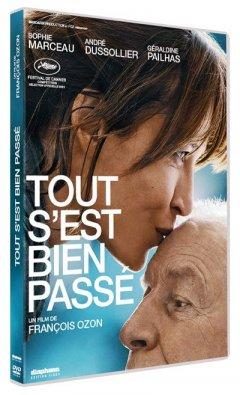Everything went well - François Ozon - review + DVD test<
Review: After Thanks to God, who lifted the veil of pedophilia within the Catholic Church, François Ozon adapts the book by his friend Emmanuèle Bernheim and tackles another fact of society: that of euthanasia, prohibited in our country , but authorized by some of our neighbours, Switzerland among others. He voluntarily extricates himself from the political context and favors the family prism, especially that of the relationship between a wounded daughter (Sophie Marceau) and a facetious and tyrannical father (André Dussollier). A way to avoid any ethical debate, to refer everyone to personal questions about their relationship to death.
- Copyright Carole Bethuel/Mandarin Prod. Foz
Admittedly, the first scenes of a puzzling realism can let fear a camera on the hospital universe and the disease. But very quickly, life takes over. Moreover, if André Bernheim wants to die, it is because he loves existence and can no longer enjoy it as he sees fit. Taking advantage of the slightest interstice to slip into his story of derision and humour, Ozon turns his back on all forms of pathos and succeeds in the miracle of transforming a work devoted to death into an act of life.Emmanuèle is at her work table when she receives a phonecall. His father had just suffered a stroke. As she runs to the hospital, troubled and contradictory thoughts jostle in her head about this wealthy and cynical parent, brilliant and authoritarian, who married out of bourgeois convenience, skilfully navigated between homosexuality and family life and maintained ambiguous relationships with the women in his life, both his wife (Charlotte Rampling) and his daughters (Sophie Marceau and Géraldine Pailhas). Emmanuèle, his favorite daughter, has never been spared either by his sarcasm or by his neuroses (numerous flashbacks give us the extent of his coldness). It is therefore to her that he entrusts his desire for death which marks the beginning of this very intimate story.
- Copyright Carole Bethuel/Mandarin Prod. Foz
The realization of an assumed simplicity keeps all morbidity at bay to let the humanity of the characters burst forth, caught in the whirlwind of things left unsaid, unacknowledged relationships and family imbalances. If Sophie Marceau, between doubt and determination, holds here one of the most beautiful roles she has offered us for a long time, it is the breathtaking performance of André Dussollier that commands admiration. He communicates to us without difficulty his pleasure in slipping into the skin of this unworthy old man, a priori not very sympathetic who, in spite of his frozen face and his labored speech, still retains enough liveliness to play down the situation with great blows of caustic and humorous. History of never sinking into melodrama, the end even allows itself to instill a few drops of suspense. A moving and worthy film, which will undoubtedly create controversy both in substance and in form, but has the he advantage of opening the reflection, without ever taking sides around a universal theme, risking to invite itself more and more often in our modern societies.
The DVD test

Image: The lighting adapted perfectly to a very wide range of locations: hospitals, family homes, outdoor scenes, etc.
Sound: Pascale takes care of a classical music festival: it shows in the choice of appropriate pieces or movements.
Supplements: The supplements are legion and enlighten the viewer on this film on a harsh subject at first glance:
Interview with François Ozon: We quote him: "I wanted to make a film about life, whereas it's a film about death." He adds: "It's the story of a man who wants to die while he loves life." François Ozon underlines the desired and developed complicity between the two sisters. It emphasizes the successful composition role of André Dussolier with his facial paralysis. He concedes that there is a "contrast between the darkness of the situation and the lightness of the father". The difficulty of helping one's parents die is an enormous weight on the children's shoulders. He confirms that the title "reflects the spirit of the film well."
Interview with the actors: The unanimous evocation of Emmanuèle Bernheim (1955-2017), author of Everything went well, is to be remembered. Indeed, she had herself helped her father to die. The fusional understanding between the two sisters goes a lot through touch. André Dussollier always admits to enjoying working with new actors. Note that François Ozon, director in a hurry, is renowned for directing in a hurry. The special effects are highlighted, including the creation of the paralyzed face requiring a lot of prosthetics and taking hours.
Deleted scenes
Light and costume tests
Poster projects
Claude de Soria, Sculptor (documentary by Michelle Porte) in partnership with the Center Georges Pompidou: It allows us to better understand the profession of the intriguing and depressive character of Claude portrayed by Charlotte Rampling.


 Tags:
Tags: Prev
Prev







